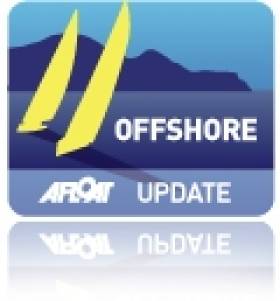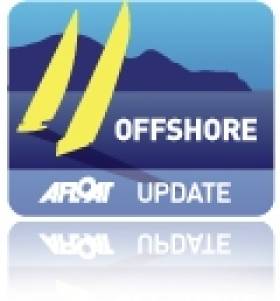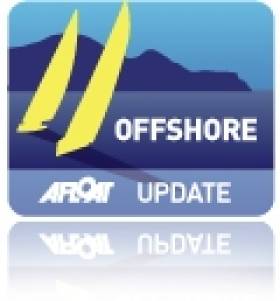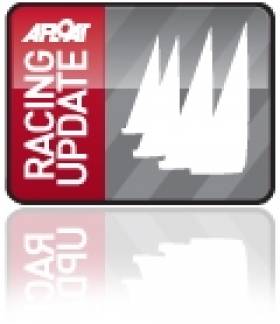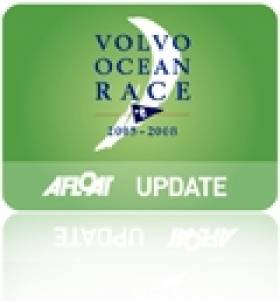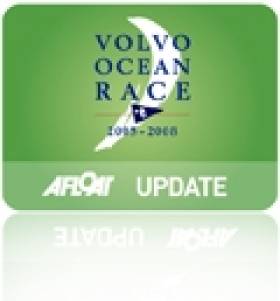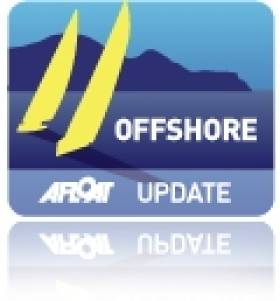Displaying items by tag: Foxall
#roundireland – After spending last Friday night in the lee of Mount Snowdon, with 35-50 knot winds and rough seas off the Welsh coast, Team Oman Sail called it a day on their ill-fated record attempt and headed back to France early on Saturday morning.
Steve Fossett's 1993 record lives on but Irish crew man Damian Foxall has promised to return and make another attempt.
If the ultra fast MOD70 trimaran gets the right conditions it is estimated as much as ten hours can be shaved off the 1993 Lakota 44 hour record, thanks to new sailing technology.
For now though, Omansail continues its three week training session (part of a build up to the Round Europe race) back in Lorient, France.
'On Tuesday we are out testing with the new Tri Prince de Bretagne', Foxall told Afloat.ie
The following week three MOD 70's go to the training centre in PLF, Oman Sail will line up with Gitana and hopefully Jean Pierre Dick's new MOD 70 Paprec Virbac.
'We've a good season ahead, a couple of short Breton races, three more training sessions, then the Round Europe with a stopover in Dublin, the Fastnet'
The miles flow easy under the MOD 70 hulls and with Foxall's commitment it look's like Omansail will certainly be back for the Fossett record.
#roundirelandrecord – A change in weather forecast has led Kerry sailor Damian Foxall to postpone his bid to beat the Round Ireland speed sailing record for 24 hours. The Oman Sail trimaran craft skippered by Sidney Gavignet is now set to arrive from France on Friday 22nd off the Kish lighthouse on Dublin Bay. The 20-year old record set by Steve Fossett in 1993 stands at 44 hours.
Foxall and his five man crew (who may yet be joined by an Irish sailor) have identified strong easterly winds gusting to over 40 knots to start the record bid. XC weather forecasts strong East South East winds for 72 hours from late on Thursday.
The National Yacht Club in Dun Laoghaire will officiate the World Speed Sailing Record bid under its Irish commissioner Chris Moore.
Foxall's Bid at Round Ireland Speed Record Starts Thursday
The MOD 70 Oman Sail, a giant trimaran will attempt to break the non-stop Round Ireland Speed sailing record starting in two days time. As previously reported Ireland's Damian Foxall confirmed to Afloat.ie this morning the bid to beat the 20-year record held by the late Steve Fossett's Lakota will more than likley start off the Kish lighhouse on Dublin Bay.
The professional crew are out to beat the one day, 20 hour and 42 minute record that has stood since 1993. To do it they must average more than 15.84 knots for the entire 700-mile voyage.
Foxall and a five man crew led by France's Sidney Gavigonet can opt to circumnavigate the country in either direction. The crew expect to encounter 40–knot winds for a time after the start according to the latest forecasts for the Irish Sea on Thursday.
According to the world speed record council (WSSR) there is only one record for whatever direction the multihull takes so she may sail north or southabout around Ireland.
Under WSS rule 20d the the only approved starting/finishing line is: Dun Laoghaire: between the light on the south pier: 53° 18.1' N; 6° 07.6' W and Kish Lighthouse: 53° 18.7' N ; 5° 55.5' W
The course must enclose the whole of Ireland and the following islands or rocks:Rathlin Is, Tor Rocks and Gulf Is, Tory Is, Eagle Is, Tearaght Is, Great Skellig, Fastnet Rock, Coningbeg Rock, Tuskar Rock.
#Irish Sailing – Foxall ready to step in to the history books, as Galway set for VOR arrival, Ben Duncan puts on an SB20 display in Tralee, Noel Butler and Stephen Oram Win Fireball Nationals, Barry Hurley wins first Round Rockall Race, an amazing last stretch performance gives Inis Mor Round Ireland victory, Kenefick retains Corinthian Quarter ton Crown, All the Royal Irish Regatta results and why its all over for the Volvo 70s in Galway. A Mermaid is battling on against the showers in a five hundred mile voyage from Foynes to Skerries.
Foxall Poised to Win Volvo Ocean Race on Home Waters
#VOR – One of Ireland's most famous and most fearless ocean sailors, Kerry born Damian Foxall, is edging ever closer to realising the dream of a lifetime in what would be a moment of national triumph when the Volvo Ocean Race ends on Galway Bay.
Foxall is watch-leader on the battling French boat 'Groupama', overall leader and current favourite to win the gruelling 39,000-mile round the world race. He has played what has been spoken of as "an inspiring role" in the boat's success so far in the race.
"The Irish Examiner" described Damian Foxall, who now lives in France, as "unquestionably Ireland's finest ocean racing sailor whose name is whispered with awe among sailing's elite. He has also been called Ireland's "most capped" sailor having won a string of the world's most famous sailing races.
Now as the 2011-2012 Volvo Ocean Race enters its final decisive phase – the six boat fleet will power its way into Galway Bay in the early hours of Tuesday morning - Foxall is poised to win sailing glory and to hear the roar of the crowd and the ringing rounds of applause in his ears.
The last time Damian heard that roar, mingled with the strains of the beguiling "The Galway Girl", was in 2009 when the "Green Dragon", on which he was watch leader, arrived in the city to a rapturous 3am stop over reception. It was a reception the like of which has never been seen before in the race history. The Green Dragon, the Chinese-Irish entry, took a podium 3rd place that night after racing across the Atlantic from Boston.
Three years later, Foxall's boat "Groupama", skippered by the legendary French sailor Franck Cammas is tightening its grip on what has been one of the toughest Volvo Ocean Races and is moving every closer to overall victory.
"Camas already has "one hand on the trophy" race commentators in Lorient said after "Groupama" snatched a vital hometown victory in the in-port race on Saturday increasing its lead on its nearest rival, the US entry, Puma to 25 points. "Groupama" now has 225 points ; Puma 200; Camper (Spain/New Zealand) 196 and . Telefonica (Spain) 194 .
The final 450 mile leg of the race from Lorient to Galway, which is now under way, carries 30 points and an in port race in Galway a further 6. The final sprint to Galway could, according to race analysts, be one of the toughest and hardest fought yet.
For Foxall, this will be his eighth race around the world and the fourth time he has taken part in the Volvo Ocean Race. He admits he is nervous about winning in front of a home crowd. Speaking in Lorient he said "It's our race to lose and anything but overall victory would be a disaster for us," the Derrynane native said. "It is totally possible to lose the race from here."
"Our job now is very different to the first three-quarters of the race when we sailed all out," cautions Foxall. "Now we have to be very aware of risk management, we have to keep our noses clean and resist pressure from Ken Read on Puma, our nearest threat." A basic failure of critical equipment causing Groupama to finish last into Galway could be enough to give the advantage to Read. Nevertheless, the prospect of a repeat of the 2009 race stop-over is causing great anticipation in the race fleet. "It's going to be big. Throughout the race, the sailors and shore-teams who were in Galway last time have all been talking about their incredible experience there. We're all aware of the extraordinary effort being made in Ireland this time so we're looking forward to it." Other crew looking forward to a special welcome in Galway include Cork sailor Justin Slattery who is bowman on " Abu Dhabi Ocean Racing". It's skipper Ian Walker was skipper of Ireland's Green Dragon in 2008-2009 . He too has fond memories of the celebrations and the atmosphere in Galway docks for the dramatic night-time arrival of the fleet in the 2008-09 race. Justin Slattery who was bowman on the 2006-2006 Volvo Ocean Race winner ABN-AMRO One, and Damian Foxall both recall that they had never seen such race finish receptions.
Writing about that night in his book "Ocean Fever", Foxall recalled "It was 3am in the morning and the crew expected to be greeted by a few die hard supporters but in fact it was more like All Ireland final day."
"Out of the darkness, a RIB pulled up beside us, her crew dressed for offshore conditions and all cheering madly. Nice welcome, we thought. But as we crossed the bay, the fleet around us grew and by the time we were getting closer to the port where the channel narrows, the fleet was huge: you could have walked from one boat to another and in the middle of the night. And we were still trying to race." There was more to come. In the dim moonlight, as the fleet crept towards Galway docks, the Green Dragon crew could just make out the enormous crowd lining every spare bit of space on the docks. "We could see the sheer scale of 9,000 people gathered at three o'clock in the morning. We never expected this."
Foxall has won some of the world's top races including the 2007/2008 Barcelona World Race sailing with co-skipper Jean Pierre Dick on the Open 60 Paprec-Virbac.
He completed a world record circumnavigation in early 2004 with Steve Fossett on the G-Class catamaran Cheyenne. He was named Sailor of the Month by Afloat Magazine in March 2004.
Foxall Makes Dramatic Lorient Comeback
#vor – Forget the soccer disappointment! Ireland is to the fore in world sailing again writes Tom MacSweeney. France's Groupama completed a heroic comeback victory on Leg 8 of the Volvo Ocean Race today strengthening their grip on the overall standings and realising a dream homecoming to the port of Lorient. Kerryman Damian Foxall is aboard and a podium finish for an Irishman in Galway beckons.
Skipper and sailing legend Franck Cammas and his men were cheered by thousands of fans on the Brittany coast after crossing the finish line at their home port at 13:31:04 local time, with an elapsed time of four days, 23 hours, 31 minutes and four seconds.
When he contracted Damian Foxall to his crew, Camas said of the Irishman: "He is such a great sailor it is better to have him with you than against."
Foxall Recalls Barcelona Race
The pair set an inaugural course record of 92 days, 9 hours, 49 minutes and 49 seconds over the round the world route, although the first edition of the race began earlier in the year – on November 11, 2007.
Foxall is currently immersed in another round-the-world project, as part of the Groupama team preparing for their entry in the 2011-12 Volvo Ocean Race – his fourth participation in the race. With less than 24 hours to go until the start of the second edition, they asked him to cast his mind back to the Barcelona World RACE start:
What feelings do you have looking back at this pre-start period of the Barcelona World RACE?
"Like any oceanic race it's an accumulation of a huge amount of effort in terms of just getting the project to the startline. The race is quite often just the end part of what is quite a long process by the skippers to realise the boat's potential, along with the shore team and the designer and the sail designers. And to a certain extent for a lot of them they'll have had the resources and time to put a bit of the writing on the wall already, in other words to arrive with the very best boat and the very best possible team they can.
"Of course what happens over the next three months might end up telling a different story but most of the guys will hope they already have done what they can to have the best boat and the best possible outcome in the race."
What is your assessment of the fleet, who are your favourites to win?
"I think Jean Pierre Dick and Loick Peyron on Virbac-Paprec 3 are of course going to be one of the favourites, they've got various successes with the Transat Jacques Vabre together, and each have more and more. I certainly hope for the best and wish good things for them.
"It's actually quite an impressive line up with Michel Desjoyeaux and Foncia, and I'm sure that will be one of the main boats Jean-Pierre and Loick have to contend with. I think Groupe Bel will have a very, very good team as well, though they're possibly less well known to the general public outside of France.
"I'm not sure what stage Alex Thomson is at, but I think that was a very good pairing with Andrew Meikeljohn. I've sailed a lot with Andy and I'm sure whatever happens they would have had a good time.
"Jean-Pierre and I had been working towards doing it again when other projects came up, and I'm pretty sure if it wasn't for the Volvo Ocean Race I'd be there this time. So I'll be rooting for my home team and hope their new boat proves fast and reliable. I know they're both more than capable of delivering the goods."
Were there any favourite moments of the race for you when you'll be thinking about the skippers in this edition?
"The halfway mark is quite an experience. By that stage there's a certain amount of writing on the wall and you're hopefully well into your stride. Halfway round the world you've settled into a rhythm and you know what your boat is capable of, you know what the other boats are capable of and so I think it's a fairly significant moment. When you go through the Cook Strait and you look east into the Southern Ocean and you're halfway round the world that's quite a memorable mark of the course I guess.
"Obviously Cape Horn is a classic. But I think the biggest memory for me was coming back, the last stage into Barcelona and the contrast from three months at sea and coming back to modern life makes quite an impression, and especially so for us, winning the first edition. It's a great landmark for all of us to come back in."
Is there anything you took from the race you'd pass on to the skippers heading out tomorrow?
"It's a huge challenge and most of the skippers who are there have either been there before or have similar experience to myself so I'm not sure I'd pass on anything that the guys don't already know.
"But it's a long way, it's three months at sea, and unlike the Vendée Globe you're going to sea with somebody else, and it's not like the Volvo where you've got a larger group of people. You're going to sea with one other person and that's probably the most important aspect in terms of the race.
"On the one hand it's the biggest attribute you've got, your buddy, your co-skipper. And it's really important to make that relationship work well and to understand what they need, and to maintain a single objective in common that you both agree on and to basically cross the line having achieved that goal. For some it might be winning, for some it might be just finishing the race, but that common objective is probably the single most important thing that the skippers need to agree on before the start."


























